Mennonite Health Journal
Articles on the intersection of faith and health
SET Reflections
Sarah Buller Phillips
from Mennonite Health Journal, Vol. 15, No. 2, April 2013
Traveling to India as a medical student has been a personal goal for several years. In college, I was very focused on completing my science prerequisites so that I could gain prompt admittance to medical school. Once in medical school, I identified fourth year as the ideal time to travel. I talked about doing an elective in India in broad, vague terms; I never took time to think about the impact of this type of trip. After months of planning, worrying, and praying, I have successfully travelled to and from India.
I spent the past five weeks at Herbertpur Christian Hospital, a mission hospital located in the northern Indian state of Uttarkarand. The hospital is situated at the foothills of the Himalayas and serves patients from the local communities as well as neighboring states. It is affiliated with the larger Emmanuel Hospital Association, which sponsors hospitals across northern India. Medical services include family medicine, general surgery, pediatric surgery, pediatric medicine, orthopedics, obstetrics/gynecology, ophthalmology, dentistry, and psychiatry. The hospital has four wards (male, female, ICU, and maternity), staffed by residents and teaching physicians. The attached outpatient clinic sees over 80,000 patients per year, and the hospital sees approximately 15,000 admissions annually.
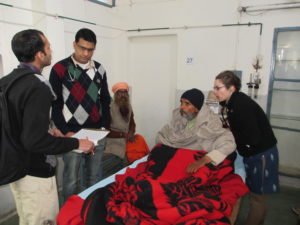 As a fourth-year medical student and soon-to-be physician, I anticipated seeing patients and making medical decisions somewhat autonomously. Prior to arriving in India, I was told by multiple people that English would be sufficient to communicate. I learned very quickly that most communication with patients was done in Hindi. While the physicians, nurses, and hospital staff were conversational in English, our patients spoke only Hindi and most had never seen an American before. Many children would stare at me, especially when I visited the hospital’s village outreach clinic; I found this incredibly humorous and loved waving and smiling at the kids.
As a fourth-year medical student and soon-to-be physician, I anticipated seeing patients and making medical decisions somewhat autonomously. Prior to arriving in India, I was told by multiple people that English would be sufficient to communicate. I learned very quickly that most communication with patients was done in Hindi. While the physicians, nurses, and hospital staff were conversational in English, our patients spoke only Hindi and most had never seen an American before. Many children would stare at me, especially when I visited the hospital’s village outreach clinic; I found this incredibly humorous and loved waving and smiling at the kids.
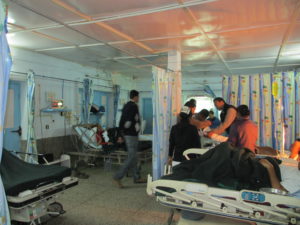 My medical experiences at Herbertpur were primarily observational; at first, this felt like a regression in my medical education. However, I realized that I could still contribute to patient care and play a vital role in medical decision-making. Through my work with the family medicine residents, I was able to collaborate and offer suggestions for potential medications or necessary ancillary medical testing. My pocket medical texts, which are commonplace among American medical students, were a novelty for the physicians and residents. I was often asked about medication dosages and indications, and I became the go-to person for researching difficult medical questions. While my patient interaction skills did not improve, I was able to hone my physical exam skills and radiology technique. I encountered dozens of patients with tuberculosis and became much more confident in lung auscultation and deciphering chest x-rays.
My medical experiences at Herbertpur were primarily observational; at first, this felt like a regression in my medical education. However, I realized that I could still contribute to patient care and play a vital role in medical decision-making. Through my work with the family medicine residents, I was able to collaborate and offer suggestions for potential medications or necessary ancillary medical testing. My pocket medical texts, which are commonplace among American medical students, were a novelty for the physicians and residents. I was often asked about medication dosages and indications, and I became the go-to person for researching difficult medical questions. While my patient interaction skills did not improve, I was able to hone my physical exam skills and radiology technique. I encountered dozens of patients with tuberculosis and became much more confident in lung auscultation and deciphering chest x-rays.
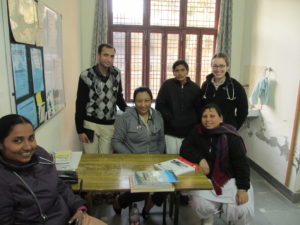 I attend a Jesuit medical school. However, the religious influence seems to end at the crucifixes hanging in patient rooms in the hospital wards. At Herbertpur, the Christian influence permeated the entire community, and I truly felt that God was present in my everyday work. Each workday began with morning devotions; nurses led the group in Hindi Christian songs followed by a reflection given by a member of the staff. Physicians, nurses, and other staff alternated providing reflections, so each morning had a somewhat different theme and style of worship. While most of the devotions were in Hindi, I enjoyed spending thirty minutes of my day in worship with other Christians. I appreciated having a dedicated time to pray. At many points during medical school, I have tried to make morning devotions a part of my schedule. I am successful for a week or so, then revert back to my old habits of sleeping in or studying before classes or clinic. It was challenging yet refreshing to be part of a medical community that made worship an integral part of each and every day.
I attend a Jesuit medical school. However, the religious influence seems to end at the crucifixes hanging in patient rooms in the hospital wards. At Herbertpur, the Christian influence permeated the entire community, and I truly felt that God was present in my everyday work. Each workday began with morning devotions; nurses led the group in Hindi Christian songs followed by a reflection given by a member of the staff. Physicians, nurses, and other staff alternated providing reflections, so each morning had a somewhat different theme and style of worship. While most of the devotions were in Hindi, I enjoyed spending thirty minutes of my day in worship with other Christians. I appreciated having a dedicated time to pray. At many points during medical school, I have tried to make morning devotions a part of my schedule. I am successful for a week or so, then revert back to my old habits of sleeping in or studying before classes or clinic. It was challenging yet refreshing to be part of a medical community that made worship an integral part of each and every day.
Having never studied abroad or done overseas mission work, I found my Indian cultural education to be one of the most important aspects of my trip. Through discussions with friends at Herbertpur, I became more familiar with various customs of the Hindu, Muslim, Sikh, and Christian faiths. Family structure and marriage was particularly intriguing, as I was engaged and trying to plan a wedding during my elective. A young Hindu resident, Rashika, shared photographs and discussed the customs of her recent engagement ceremony in Delhi; I told her about my Christian wedding ceremony and the drastically different Western rituals of marriage. I learned about arranged marriages and love marriages in India and the vital role that extended family plays in these unions. It is amazing how my current life circumstances permeated my life in India; miles away from home I found my cultural questions to be shaped by my current concerns at home. It will be interesting to return to India in a few years; I imagine that my inquiries will be very different and I will learn more about a different aspect of Indian culture.
My time at Herbertpur demonstrated that faith and medicine truly can coexist. This has been a personal struggle for me, as I strive to live my life as a reflection of Christ while simultaneously respecting the sometimes conflicting views of my patients. In my patient encounters, I am reluctant to discuss faith and religion, although I cognitively recognize the importance of a belief in a higher power on one’s health and wellness. I was able to work with the psychiatrist at Herbertpur, Dr. Raja Paulraj. Dr. Raja spoke with many of his patients about the intersection of mind, body, and spirit. Using a diagram of intersecting circles, Dr. Raja emphasized that when our mind or body is “sick”, our spirit is also “sick.” It is important to nurture all aspects of ourselves. Medication may help one’s body or mind, but it does little for the spirit. It is important to invest in one’s spiritual health; this can be done through organized worship or personal reflection. I think this perspective could easily be translated to Western medicine and is applicable to patients of all faiths.
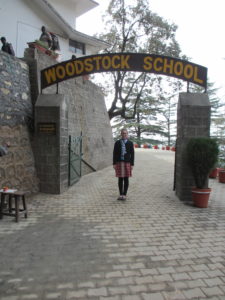 On a more personal note, my trip to India served as a pilgrimage of sorts. My grandmother grew up attending the Woodstock School in Mussoorie, India, a Himalayan hill station about two hours from Herbertpur. On a free weekend, I was able to travel to Mussoorie and see Woodstock. It was incredibly surreal to see the place where my grandmother spent her formative years. I walked on the same stairs as she did, felt the same banisters, and stepped into the same classrooms. My family and personal identity is tied to this foreign place, and this trip facilitated an even stronger connection between me and my grandmother. Both during my trip and upon my return, I was able to speak to my grandmother, creating connections that none of her children or grandchildren have been able to make. My grandmother is so proud of me, both for giving my time to those less fortunate than myself, but also for making her heritage a more prominent part of my own.
On a more personal note, my trip to India served as a pilgrimage of sorts. My grandmother grew up attending the Woodstock School in Mussoorie, India, a Himalayan hill station about two hours from Herbertpur. On a free weekend, I was able to travel to Mussoorie and see Woodstock. It was incredibly surreal to see the place where my grandmother spent her formative years. I walked on the same stairs as she did, felt the same banisters, and stepped into the same classrooms. My family and personal identity is tied to this foreign place, and this trip facilitated an even stronger connection between me and my grandmother. Both during my trip and upon my return, I was able to speak to my grandmother, creating connections that none of her children or grandchildren have been able to make. My grandmother is so proud of me, both for giving my time to those less fortunate than myself, but also for making her heritage a more prominent part of my own.
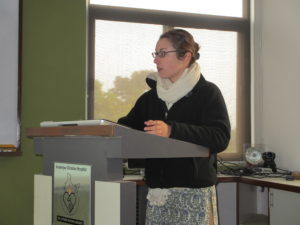 One of the most important lessons I learned was to trust myself. I was very nervous about my trip. I am a stickler for organization and appreciate an attention to detail. I found that “orientation” meant something different in India, and my ability to be flexible was essential. Travelling alone, I spent a lot of time with myself, which was valuable time to reflect, pray, and question my purpose in India. I became very good at asking others for help, something that I tend to avoid in America. It was a blessing to be a part of a community that valued personal and family time, and I slowly came to appreciate the absence of constant connectivity to the outside world and the slower pace of life. American medical education is fraught with doubt, and my time in India provided me the courage and confidence that has been missing from my education. I feel empowered; I went to India, alone, and came back alive.
One of the most important lessons I learned was to trust myself. I was very nervous about my trip. I am a stickler for organization and appreciate an attention to detail. I found that “orientation” meant something different in India, and my ability to be flexible was essential. Travelling alone, I spent a lot of time with myself, which was valuable time to reflect, pray, and question my purpose in India. I became very good at asking others for help, something that I tend to avoid in America. It was a blessing to be a part of a community that valued personal and family time, and I slowly came to appreciate the absence of constant connectivity to the outside world and the slower pace of life. American medical education is fraught with doubt, and my time in India provided me the courage and confidence that has been missing from my education. I feel empowered; I went to India, alone, and came back alive.
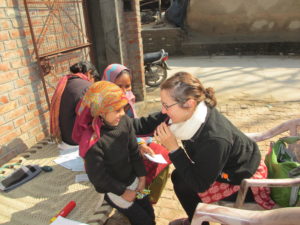 In looking to my future, I see overseas medical work as a way for me to share my gifts and talents with those less fortunate. I began this experience with an open mind; I concluded my trip with thoughts to my next journey. I feel called to work with an underserved patient population, and as a future family medicine physician, I will have ample opportunities to serve within my home community. However, international medicine has a unique way of putting the stresses and challenges of daily life into perspective. When the protocols and regulations of American healthcare are removed, medical care is focused more on the patient and less on the paperwork. I anticipate future international travel will play an essential role in keeping me excited about the changing American healthcare system.
In looking to my future, I see overseas medical work as a way for me to share my gifts and talents with those less fortunate. I began this experience with an open mind; I concluded my trip with thoughts to my next journey. I feel called to work with an underserved patient population, and as a future family medicine physician, I will have ample opportunities to serve within my home community. However, international medicine has a unique way of putting the stresses and challenges of daily life into perspective. When the protocols and regulations of American healthcare are removed, medical care is focused more on the patient and less on the paperwork. I anticipate future international travel will play an essential role in keeping me excited about the changing American healthcare system.
About the author
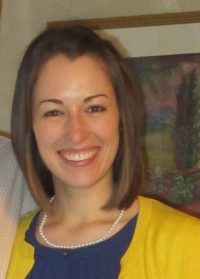 Sarah Buller Phillips was a fourth-year medical student at Saint Louis University, a Jesuit institution in St. Louis, Missouri, when she wrote this. She began a family medicine residency at Brown University in Providence, Rhode Island, in June 2013. After residency, she is interested in pursuing a career in urban, underserved medicine at a federally qualified health center. Her medical interests include mental health and lifestyle medicine. Since her travel to India, Sarah celebrated her marriage to John Phillips on April 6th. The couple will be moving to the Providence area in early June. Sarah grew up in Lenexa, Kansas, and attended Bethel College.
Sarah Buller Phillips was a fourth-year medical student at Saint Louis University, a Jesuit institution in St. Louis, Missouri, when she wrote this. She began a family medicine residency at Brown University in Providence, Rhode Island, in June 2013. After residency, she is interested in pursuing a career in urban, underserved medicine at a federally qualified health center. Her medical interests include mental health and lifestyle medicine. Since her travel to India, Sarah celebrated her marriage to John Phillips on April 6th. The couple will be moving to the Providence area in early June. Sarah grew up in Lenexa, Kansas, and attended Bethel College.
